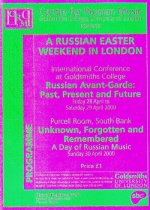This elaborate event was a sequel to the Rimsky-Korsakov conference and concerts organised by Goldsmiths Centre for Russian Music with South Bank Centre last year. A two-day conference brought together worldwide academic expertise for a packed programme of lectures, seminars and concert presentations. There was also a round table discussion at the Purcell Room about Russian Music in the Millennium, but the experts were visibly reluctant to take up the generalisations about the state of musical composition in Russia itself now, or about the effects of the recent Russian 'Diaspora' posed by the chairman, Norman Lebrecht.Sampling but two of the wide ranging sessions at Goldsmiths, I heard Chris Dempsey unravelling surviving fragments of a famous Futurist opera, Victory over the Sun; Daniel Jaffe, author of Phaidon's book on Prokofiev, discussing the composer's experimentation during 1915-29, and Noelle Mann, Curator of the Prokofiev and Schnittke archives, who gave a fascinating talk about the young Prokofiev's constant striving for originality, and his battles with the incomprehension of his aims in the Love of Three Oranges, drawing upon letters in the Archive. Those were the sorts of talk with which the BBC Third Programme used to enlighten and entertain us, before we were 'dumbed down' with a diet of 'interviews', which satisfy today's short attention spans for serious discussion. Elena Firsova presented her Mandelstam Cantata Before the Thunderstorm, recorded at a recent celebration concert of her music at RAM, available now on the Meladina Record label (Enquiries to dmitrismirnov@lineone.net).
The impression that the Twenties, and just before, was a period of artistic ferment in Russia, leaving much still to be discovered, was reinforced strongly by the day of music on the Sunday at the Purcell Room. Highlights from the three concerts I was able to attend included a spectacular cello/piano recital with Geoffrey Tozer (piano) by the indefatigable Alexander Ivashkin, recently appointed Professor in charge of the adventurous Department of Music at Goldsmiths, organiser of this conference, author of the important Phaidon book on Schnittke and virtuoso cellist extraordinaire. They devoted an exhilarating hour to the 1924-26 cellos sonatas of Alexander Tcherepnin and his revolutionary Well Tempered Cello pieces on nine note tone rows of his own devising. They ended with Tcherepnin's last cello works, songs and dances composed for Piatagorsky in 1954, much smoother in style, just as Prokofiev's later music became also. Tozer astonished with his easy and unassumeing virtuosity and Ivashkin gave his all, ending up in a frenetic assault on this modernistic music with four stands of his bow broken and flailing at both ends. They have recorded this repertoire for Chandos [CHAN 9770] and it is a remarkable late discovery after the centennial celebrations for the composer last year.
Boris Berman played a 1909 piano sonata by Pasternak, author of Doctor Zhivago and Nobel Prize winner, who had contemplated a professional career as a composer. Derivative and Scriabin-influenced, I felt his decision afterwards to forsake music and avoid all encounters with musicians proved a sound career choice! In this loud, over-pedalled performance Berman seemed not to have his heart in the work. Far more interesting was Lyatoshinsky (1895-1968) whose 1926 violin sonata, played by Oleh Krysa and his wife Tatiana Tchekina, confirmed its reputation as unique in 20 C. violin literature. Written in the same year as appeared Schoenberg's Septet, Kodaly's Hary Janos, Janacek's Slavonic Mass and Bartok's first piano concerto, Lyatoshinsky's unified thematic transformations and continual development made a powerful impression as a representative of the submerged, hidden part of the iceberg which we may think of in our ignorance of a vast mass of exciting Russian music of the time.
Berman played Ustvolskaya's Preludes (see my extensive CD survey on MotW) which could not be played until after the Kruschev thaw. To my mind, his playing was too beautifully nuanced for this composer who characterised her music as a 'laser beam cutting heavy metal'. Schnittke's Five Aphorisms (1990) had a UK premiere, strong, austere pieces which could usefully be taken up by pianists. Firsova's Fantasy (1985) for solo violin was poetic and virtuosic by turns, another concert piece well worth looking at. Krysa & Tchekina's account of Prokofiev's 1st Violin Sonata (played less often than the second, which is a transcription of his flute sonata) made a good ending to the day, once over a false start marred by an unfortunate (and salutary) incident with a mobile phone whose tune had refused to be switched off until it was ceremoniously confiscated and taken away! Those reminders at concerts really are needed.
Peter Grahame Woolf

 Return to:
Return to: